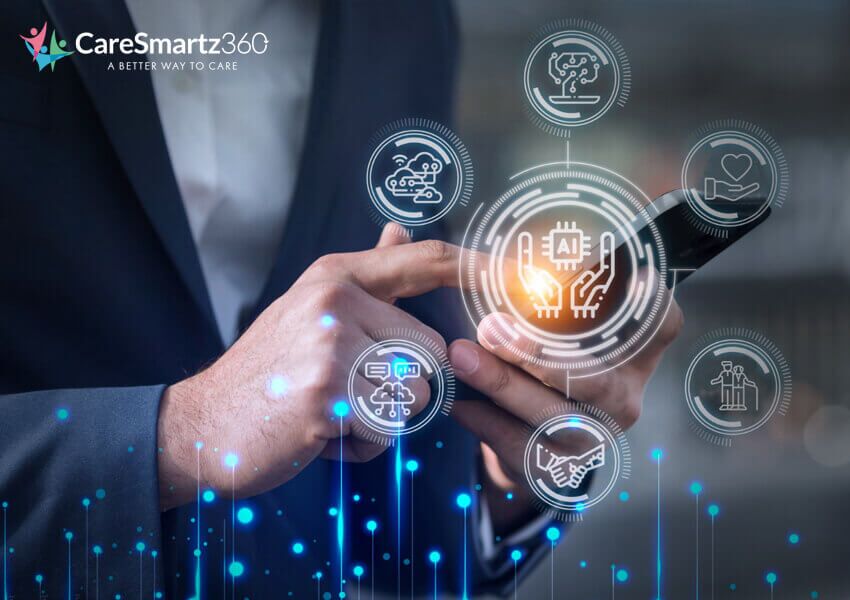
In the caregiving agency sector, the search for excellence is ongoing. But it is easier said than done. Catering to the unique needs of multiple home patients nationwide is laborious and intricate.
But what if there were tools that could meet these challenges and redefine how care is delivered?
Enter AI and automation— where innovation meets necessity.
Imagine schedules optimized effortlessly, decisions driven by data, and care tailored to individual needs. It’s a domain where your agency isn’t just keeping pace but leading the charge toward a brighter future for home care.
In fact, 83% of executives believe science and tech capabilities can tackle global health challenges.
– Accenture
So, if you are looking to –
Keep on reading!
Let’s break down the basics first. What distinguishes AI from automation, and do they collaborate or function independently? While these terms might sound like jargon, they’re crucial for agencies in home care, regardless of their tech expertise.
AI functions like a smart brain for machines, letting them learn from experiences and correct themselves to make decisions. This means it can process required learning from past experiences and self-correction to make a certain decision and to reach a certain conclusion.
On the flip side, automation runs tasks independently, following preset rules without much human input.
And the best part? They team up seamlessly! Automation does its thing, collecting data during repetitive tasks, while AI steps in, using that data to predict and create new processes.
AI is changing mental healthcare at home. Dealing with mental health issues like depression, anxiety, and dementia among home care patients is crucial for their well-being. Recently, smart algorithms in the AI world can analyze big sets of patient info, covering both clinical and social aspects.
Here’s how it works: AI processes this heap of data, finding patterns and sorting patients into groups based on their needs. It’s not complicated; it’s about spotting trends in behaviors and risk factors and figuring out if certain mental health conditions might worsen.
Why does it matter? This approach helps agencies help caregivers create plans that fit each patient. It is a customized strategy, suggesting cognitive exercises or specific therapies. It combines AI, cloud-based home care software, and a human touch that makes mental health care at home unique.
Home care agencies can use machine learning to fine-tune caregiver schedules and routes. By employing AI algorithms that analyze patient needs and geographic locations, agencies can craft efficient schedules, minimizing travel time and maximizing the impact of care.
AI-based home care software goes beyond generic insights. It dives into agency-specific data on caregiver performance, client outcomes, and operational processes. This tailored approach allows the software to identify areas for improvement, cost reduction, and efficiency enhancement. It’s like having a virtual consultant offer precise recommendations tailored to the client’s needs.
Automation takes center stage in boosting operational efficiency. Administrative tasks like scheduling, billing, and record-keeping can be seamlessly automated. This shift allows office staff to redirect their time and energy towards delivering high-quality care. The result is increased accuracy, minimizing errors in billing or client records, and a significant productivity boost, enabling staff to achieve more in less time.
Machine learning algorithms sift through heaps of client data, spotting patterns and foreseeing potential health risks. This shift from reacting to health issues to proactively addressing them is a game-changer for home care. In the past, agencies relied on manual processes, reacting after problems had escalated, making management less effective. Machine learning improves event predictions significantly, reducing over-diagnosis by 54%. Early intervention becomes the norm, lowering the chances of severe health issues and hospital readmissions.
Automation has transformed how visits are scheduled in the home care industry. Before automation, agencies grappled with manual scheduling and routing, resulting in inefficiencies, wasted resources, and suboptimal client care. Advanced algorithms take it a step further, optimizing automated scheduling and routing for caregivers. These algorithms consider travel time, caregiver skills, and client needs. It’s like having a smart assistant ensuring every visit is timely and tailored to provide the best care possible.
The future holds exciting opportunities for AI and automation to revolutionize this process. Looking ahead, AI could pave the way for tailored care plans. AI-driven algorithms, equipped to rapidly analyze vast amounts of data, considering individual health conditions, preferences, and needs, have the potential to create truly personalized care plans. For instance, AI could identify patterns in a client’s behavior and medical history, recommending a care plan that provides the right support at the right time.
What’s the future? AI in the home care industry is no longer a distant dream—it’s happening now. Machine learning ecosystems are set to shape the next decade of the home care sector, offering a more appealing option for patients seeking care in the comfort of their homes. Virtual reality and augmented reality are poised to offer immersive experiences for patients, promoting mental well-being and reducing social isolation.
At CareSmartz360, we foresee a world where home care management software, powered by these emerging technologies, facilitates remote consultations with home care providers.
At CareSmartz360, we’re not just envisioning the future—we’re building it. We foresee a world where our home care management software, powered by these cutting-edge technologies, bridges the gap, enhances communication, and ultimately improves the quality of care for every individual.
Our users reported 95% customer satisfaction in 2024. Schedule a personal walkthrough to see CareSmartz360, home care software in action.